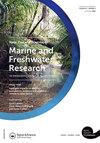河口恢复中的参与式过程和环境议程的演变:maketi案例
IF 1.7
4区 环境科学与生态学
Q3 FISHERIES
New Zealand Journal of Marine and Freshwater Research
Pub Date : 2022-06-16
DOI:10.1080/00288330.2022.2086586
引用次数: 1
摘要
本文分析了北岛东海岸maketki河口恢复的参与性过程,以研究关键利益相关者和Māori之间不断变化的关系动态如何导致集体环境想象的实现。该案例的特点是,在凯图纳河改道和由此导致的河口退化问题上发生了历史上的冲突,导致了2006年至2009年期间社区参与的重点时期,确立了恢复河口生态健康的集体意向。持续的社区参与一直是修复项目设计和实施的一个特点。在研究这个案例时,我们利用想象的概念,指的是对理想未来的共同愿景,来探索“过程的想象”和“结果的想象”是如何在形形色色的利益相关者和土著行动者中发挥作用的。我们对相关文件以及25名参与者的访谈和焦点小组进行了话语分析,以展示包容性参与式过程如何被用作解决河口退化的技术,解决Māori、社区和地方当局之间的历史不满,并重新设置这些参与者之间的治理和管理关系。本文章由计算机程序翻译,如有差异,请以英文原文为准。
Participatory processes and the evolution of environmental agendas in estuary restoration: the Maketū case
ABSTRACT The article analyses participatory processes in estuary restoration in Maketū on the East Coast of the North Island to examine how evolving relational dynamics amongst key stakeholders and Māori led to the achievement of a collective environmental imaginary. The case, marked by a history of conflict over the diversion of the Kaituna River and resulting estuary degradation, led to a focussed period of community engagement between 2006 and 2009 which established a collective intention to restore the ecological health of the estuary. Ongoing community engagement has been a feature of restoration project design and implementation. In examining this case, we draw on the concept of imaginaries, referring to shared visions of desirable futures, to explore how ‘imaginaries of process’ and ‘imaginaries of outcome’ played out among a heterogeneous set of stakeholders and Indigenous actors. We undertake a discourse analysis of relevant documents and of interviews and focus groups with 25 participants to demonstrate how inclusive participatory processes were used as a technique to resolve estuary degradation, address historical grievance between Māori, the community and local authorities, and reset the governance and management relationships between these actors.
求助全文
通过发布文献求助,成功后即可免费获取论文全文。
去求助
来源期刊
CiteScore
4.50
自引率
12.50%
发文量
35
审稿时长
3 months
期刊介绍:
Aims: The diversity of aquatic environments in the southern continents and oceans is of worldwide interest to researchers and resource managers in research institutions, museums, and other centres. The New Zealand Journal of Marine and Freshwater Research plays an important role in disseminating information on observational, experimental, theoretical and numerical research on the marine, estuarine and freshwater environments of the region.

 求助内容:
求助内容: 应助结果提醒方式:
应助结果提醒方式:


